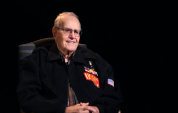2:47 | Donald Whipple explains how his unit could suffer a 200% casualty rate in the battle of Iwo Jima. He also recalls a moment of panic when there was a gas attack alert and the gas mask he'd found had a bullet hole right through it. (Provided by LifeCairn, Inc.)
Keywords : Donald Whipple Okinawa Iwo Jima reserve Kamikaze casualty rate replacement zombie gas gas mask

Young Donald Whipple had just read a book named They Were Expendable about PT Boat crews in the retreat from the Philippines. He was inspired to see if he could measure up to the heroics he read about, so he joined the Marines. As he got off the train, he heard from Marines at the station a refrain he would hear many times in the next few weeks, "You'll be sorry!" (Provided by LifeCairn, Inc.)
The 5th Division was an entirely new Marine division and Donald Whipple felt lucky to be one of the first soldiers assigned to it. Just before shipping out to the Pacific, he had an emotional meeting with his father, which gave him encouragement and inspiration in the fight to come. (Provided by LifeCairn, Inc.)
The method was primitive but effective, says Donald Whipple as he describes the targeting procedures of the artillery Forward Observer. It usually only took three shots to zero in a target. (Provided by LifeCairn, Inc.)
New Marine Donald Whipple had practiced amphibious landings over and over in California. That was good because it helped him remain calm as he waited to go ashore at Iwo Jima, watching in amazement the unrelenting Naval bombardment of the island. (Provided by LifeCairn, Inc.)
Donald Whipple relates in vivid detail what it was like waiting off the shore of Iwo Jima in a troop ship, having a full holiday dinner for breakfast, climbing down the rope net to the landing craft and making the run to the beach. (Provided by LifeCairn, Inc.)
He came off the landing craft on the Iwo Jima beach and hit the deck, wishing he had a hole to jump in. But when his Captain said, "Let's go," Donald Whipple got up and took off. His job was to bring in a machine gun cart and he struggled to pull it through the loose volcanic soil. Then, just as he reached the top of the beach terrace, a mortar shell hit right next to him. (Provided by LifeCairn, Inc.)
The wounded from the Iwo Jima beach were placed in a landing craft to be moved to a ship but the ships were already packed with wounded. When they were denied at the fourth ship, the pilot of the craft refused to budge until the casualties were taken aboard. Donald Whipple recalls that ordeal and also the lonely feeling of observing a burial at sea. (Provided by LifeCairn, Inc.)
Donald Whipple had to get back to his unit. The wounded Marine was off shore on a hospital ship and he couldn't stand the thought of sitting on Guam while his buddies were under fire on Iwo JIma. He saw a sailor working on a landing craft and asked for a lift back to the beach. (Provided by LifeCairn, Inc.)
Donald Whipple had fled the hospital ship and returned to his unit on Iwo Jima. He was targeting artillery when he encountered a soldier who said he was looking for a pipe to use as a flagpole. The pipe was found and they watched as a foreign flag was raised over Japanese territory for the first time in centuries. (Provided by LifeCairn, Inc.)
He knew that being a replacement was a difficult thing, so Donald Whipple took the new guy who joined the unit at the last minute under his wing. Then, in a foxhole on Iwo Jima, the kid raised his head up a little too high. (Provided by LifeCairn, Inc.)
The demanding physical conditions during the battle for Iwo Jima are recalled by Donald Whipple. Not being able to get any sleep was probably the worst but there was also a strange, low fog which the mind filled with enemies who weren't really there. (Provided by LifeCairn, Inc.)
After the surrender, Donald Whipple's unit entered Sasebo, Japan, where they were tasked with rounding up and destroying military gear. As they sat and watched the bonfires, children came up and made fast friends. The unit moved to Nagasaki, where the soldiers marveled at the devastation. (Provided by LifeCairn, Inc.)
As Donald Whipple walked guard duty in postwar Japan, he could hear the mothers and the babies wailing and crying in the adjacent refugee camp as a lonesome train whistle blew. To this day, when he hears a train whistle, he is taken back in his mind to that sad place and time. (Provided by LifeCairn, Inc.)